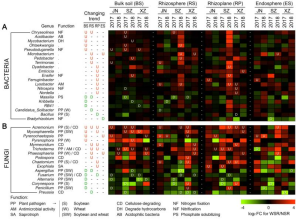A group from Key Laboratory of Plant Immunity, Department of Plant Pathology, Nanjing Agricultural University, Nanjing 210095, China, etc. has reported that wheat straw return affects rhizo-microbiome.
https://www.ncbi.nlm.nih.gov/pmc/articles/PMC8951542/
Wheat straw return (WSR), i.e., wheat stalk, was crushed into pieces and added directly to the soil surface in a Wheat–Soybean Rotation System. Little is known about how WSR affects crop-root-associated microbiomes, which are more intimately linked to plant health than field soil.
In this report, there was no significant changes in relative abundance of bacterial genera with WSR, however, it was not true in fungal genera, interestingly.
In detail, the relative abundance of some plant pathogen-associated fungal genera, e.g., Fusarium, and Alternaria, decreased after WSR, while the relative abundance of Acremonium, Mycosphaerella, Pyrenochaetopsis, Pyrenophora, Trichoderma, and Phaeosphaeria increased. These latter fungal genera are known to be associated with cellulose degrading activity.

Where, “U” and “D” mean that the relative abundance significantly increased and decreased, respectively. Rhizosphere (soil close to the root surface (RS)), rhizoplane (root surface (RP)), and endosphere (root interior (ES)).
